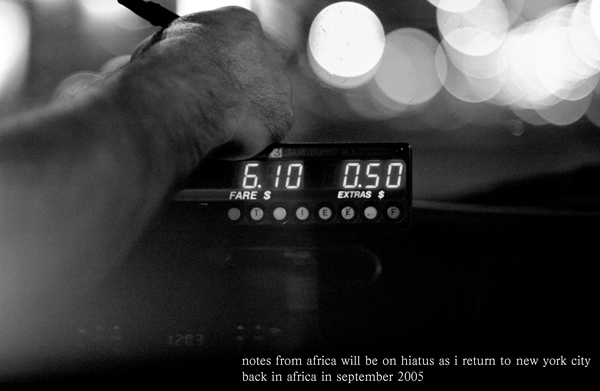Northern Uganda - Gulu Province
I went looking for dirty drinking water this morning.
Stuffed in the back of a blue Toyota land cruiser with a human rights activist and two local Ugandan humanitarians, I hurtled north towards the Sudanese border. A military truck carrying five camouflauged army fighters with AK-47's followed closely behind, the soldiers choking in our red dust.
We passed several army roadblocks and convoys, necessary measures in Uganda's wild wild northwest to defend travelers and Acholi villagers from Joseph Koney's dangerous LRA rebel soldiers recently seen in the area. I took in a Ugandan sky with a bigness hard to describe. It's a sky that seems to press too close to the ground as stacks of cumulous layer then rupture to reveal patches of deep blue.
Blue feels out of place here.
16 miles shy of the Sudan border, we reached our destination. the Atiak IDP camp, home to 23,638 Internally Displaced Persons in crude circular mud huts with thatched straw roofs. They abandoned their villages 10 years ago when their children were snatched from their homes by Koney's troops and forced to bear arms, to kill. 150 of them were massacred in town center in 1995. Now, there is safety in numbers, safety in the camp.
"Take me to the water source" I asked Alex, one of the camp's leaders, who cheerfully led me outside the camp through tall grass and down a slope to a water hole. A few acholi women were gathered there, drawing water from a source that some time ago would have shocked me.
The water was murky, stagnant, unsafe. Through Alex, I asked them why they were gathering water here, when there were 10 bore wells scattered throughout the vast camp. I listened and learned that the lines to take water from the cement wells were between 6 - 8 hours long. That the wells served more than 2300 people each and didn't produce enough water. The women couldn't wait in line today and like many others, had come to gather water from this fetid mud hole.

Many here in East Africa don't even have their choice.
During my extensive tour of Rwanda last week, a little more than an hour south of its broken and busy capital, I took the following pictures of a local source of drinking water. I then choked back anger and tears as viscous, brown water was gathered from a swampy pit and poured into filthy $3 jerry cans, then strapped to bikes and hauled miles uphill to be used for drinking, cooking and washing.

"Why don't they just boil the water?" I've been asked more than a few times.
Rwanda's and Uganda's poor live on less than $1 dollar a day, so the answer is simple. They don't have the money to buy the charcoal that would sanitize their water.
So they die of thirst - literally. Their children die of diarrhea, as they drink contaminated water that dehydrates them and makes them thirst for more of the same. A vicious cycle of dirty fluid and death. They contract worms and parasites, and even nastier diseases with long clinical names and too many consonants.

charity:
Those of you who've been in contact with me for the past few months or have heard me lecture, know I've poured all my time and energy into setting up a non-profit entity in New York City I called simply, charity:
In may, when I toured 10 European cities in three weeks speaking about the incredible work of mercy ships, I was taken aback at a general disenchantment with giving - a lack of confidence in charity's effectiveness.
"Only 20 cents of my dollar reaches the poor" I would hear or "What about all the money wasted during the Tsunami? Or Katrina?" "Some guy's driving a lexus in South Africa with my pledge."
Charity for me is different than that. From the latin word "caritas" it simply means love. Webster defines it as the voluntary giving to those in need. To those that need our help. Because we can. The King James Bible reads, "If i have not charity, I am nothing." It says that those without charity make noises like banging cymbals, like gongs. Empty noises.
I knew that well, living for more than a decade in New York making those empty sounds.
The vision for charity first came to me in Liberia as I realized the disconnect of so many I knew from the actual issues of poverty, and of the incredible work being done on the ground. The idea was simple, and something I'd done before with the mercy show in New York. Produce global exhibitions that educated the public about crucial issues, then connected them to the "little guys" - the small, over-performing non-profits i'd seen struggle for awareness and funding. I wanted to allow the public to be part of a tangible solution, then close the loop with photographs and video and show them what those solutions looked like.
charity: will do three things.
1. Education and Awareness. We'll teach the public about important global concerns like water & sanitation, hunger, child trafficking, genocide, preventable diseases, education and more. we'll do this initially through high profile exhibitions in the indoor galleries and outdoor parks of major world cities. We'll use multimedia and webcams to really show what's going on in the developing world, connect you to the need.
The exhibitions will capture imaginations, transporting viewers to the developing world and then offer glimpes of hope. Imagine stepping into an IDP camp, or loading a giant famine relief plane with $16 bags of rice in a city park. Imagine the opportunity to buy vaccines, Anti-Retroviral drugs or malaria bed nets for pennies and dollars that actually reach those in desperate need of them. Or $20 bottles of spring water where 100 percent of the money translates directly into freshwater wells for those without access to clean water.
2. Non-Profit Support. We'll provide financial and promotional support to highly efficient and effective non-profits. we've partnered with america's largest non-profit watchdog, charitynavigator.com. Trent and his crew will make sure we select only the most fiscally responsible and productive non-profits. we'll connect you with the underdogs, the underfunded non-profits who aren't advertising on billboards or on television, the unsung heros out there every day - digging wells, running health clinics - educating, feeding, adopting, caring.
3. Donor Support. We'll allow donors put a face to their giving and actively engage in the process of giving. Imagine logging onto a webpage every morning to see the foundation dug of your primary school in india, or the bricks stack higher on your health clinic in West Africa. The pump churning water atop your company's freshwater well in Central America.
>>>>
I need your help now. We need money.
The first issue we're tackling with a show is water. We've done extensive research for two months to learn as much as we can about the issue, and the facts are startling.
- More than 1.2 billion people lack access to clean water.
- More than 1 billion walk more than 3 hours a day for their water.
- And when I flush the toilet in my Soho apartment, I use more water than someone in the developing world does all day to drink, wash, cook and clean. That's unacceptable to us because something can be done about it. I've conceptualized and begun to build an outdoor water exhibition that will begin in New York and then move to other cities.
We now need your financial support to realize the show.
The charity: water show looks like four 12 foot by 8 foot walls with aquariums containing "dirty" water that face off against a 16 foot plexiglass cylinder containing a thousand bottles of $20 custom labeled water. The inner walls educate the public about water and highlight the work of four organizations diggin freshwater water wells in the world's poorest countries. We'll sell the water during the hot summer days and use 100 percent of the money away build wells in impoverished nations. It's that simple.
Get the project proposal PDF by clicking here.
If you're in a position to financially support charity: or the water project with a one-time or monthly gift, please just reply to this email. I fly back to NY next week to fundraise and build the show in time for its September NYC launch.
A big thanks to the hundreds of you that have offered to volunteer in NY for the project. You'll hear from us soon. And crack NYC-based web designers Code & Theory have graciously begun helping us develop our beta website, so stay tuned for the launch of www.charityis.com
Scott Harrison
from Uganda
August 4, 2006
scott@charityis.com
------------------------------------
To see all water images from local sources in Rwanda & Uganda, open the gallery here
To see images of the Rwandan genocide from the mass graves and memorials, open the gallery here
(WARNING - STRONG CONTENT)
mercy. coming home.
I write this 35,000 feet above the North Sea, somewhere between London and Berlin. The sun sets behind our Airbus, highlighting an endless blanket of cumulous in pink and gold and blue. It will change color and fade to gray and black before I finish. After only a week and a half in London, I already miss West Africa. Speaking engagements and forward planning have kept me too busy to reflect and process, to write. Yet here, on a tray table high above the clouds I'll try. A place closer to heaven than not, disconnected from both both developed and developing worlds. London's never been cheap for Americans - even New Yorkers, but in contrast to Liberia, it seems profane. Dinner last night with two friends at a bustling but ordinary brasserie in Notting Hill cost $336 - the bill graciously grabbed with a wink as I smiled and offered the tip. To a bar afterwards for $14 cocktails. Comparisons. Are they helpful? Can they somehow bridge the growing gap between rich and poor? Just weeks ago in Monrovia I stopped in on Beatrice, a forty-something woman who almost suffocated to death after almost 20 years with a benign tumor before receiving free surgery on the Mercy Ship. I'd previously been able to help her with "small money" that got her off a concrete floor onto a simple mattress and put mosquito netting around said mattress. Beatrice asked me about her roof. The rainy season was quickly approaching, the recent torrential downpours leaving us with no doubt about the well-known fact that Liberia gets more rain than anywhere else on the planet. Beatrice's roof was leaking, and she asked me in simple, broken English to help. I have to admit, I'm ashamed of my first reaction. Having little money myself, I wasn't sure I'd be able to help her more. And then she told me how much. $20 US. I bought four long sheets of zinc to cover the large room and stopped the rain from coming in. Perhaps that's what I'll miss the most these coming days as I try to preach the poor at home with my pictures and stories. It's selfish, maybe, but the stakes are so high in the developing world. Simple acts of personal intervention, little sacrifices can so drastically and visibly change lives. I'll miss buying the $22 bag of rice that feeds a family of 4 for more than a month. I'll miss paying a landlord $120 for a year to move a mother and her two previously blind children out of a refugee camp and into a home. I'll miss taking a patient to the dentist where $60 replaces 8 teeth stolen by a tumor and creates a brilliant smile. I'll miss so easily spending $55 to put a boy through school. A boy burned by rebel soldiers, healed by doctors who took a break from their lives and released an arm fused to his side so that he could write. It's intoxicating, addicting. And I think we need to be doing more of it I'm 30 years old now, and if you'd asked me a few years ago over a plate of cocaine what I'd be doing today, the answer definitely wouldn't have been "trying to save the world." Charles Bukowski, a writer who would certainly have appreciated the previous reference, said: "You begin saving the world by saving one person at a time; all else is grandiose romanticism or politics.” Granted, certainly not an original idea. In fact, terribly cliché even. Mother Teresa said "if you can't feed a hundred, feed one." And what about the proverbial kid walking on a beach next to thousands of starfish dying in the sun, confronted with the enormity, the futility of his task. As he tossed them into the surf one by one, he said, "well it made a difference to that one." I think if I've learned anything in this past year and a half in Africa, it's the power of that idea. And I think what I'm after in the coming years as I try to walk between both worlds - developing and the developed - to bring Beatrice and Alfred and Marthaline and Harris closer to South Kensington and the Meatpacking District. It's really a strong notion - that of the lost sheep, the lost coin, the prodigal son. That they matter, that they can be found, saved. That they can speak to larger change. That individual acts of mercy, of compassion can change countries, continents. Peoples. I'm sold. More from New York City in the coming weeks about where I hope to take mercy. over the next decade. I'll need your help.
mercy. london
more than 150 came to see scott talk about mercy. in the apple store on regent street in London. Scott heads to Berlin Sunday, then back to New York City to fundraise and plan 10 global mercy. shows. 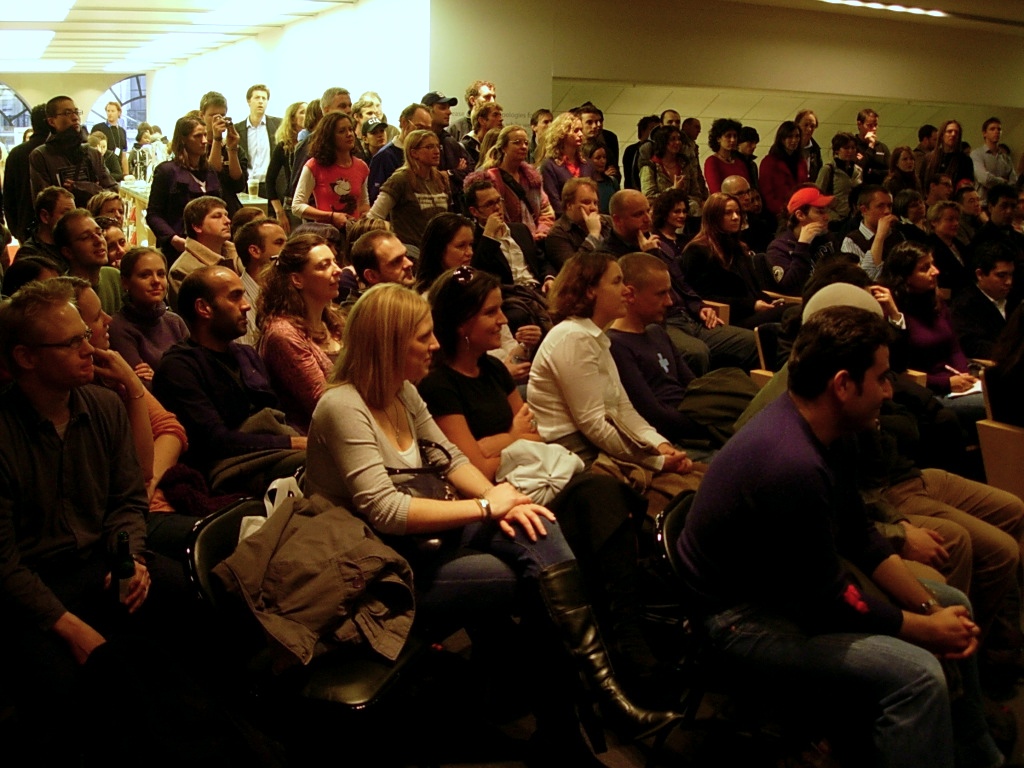 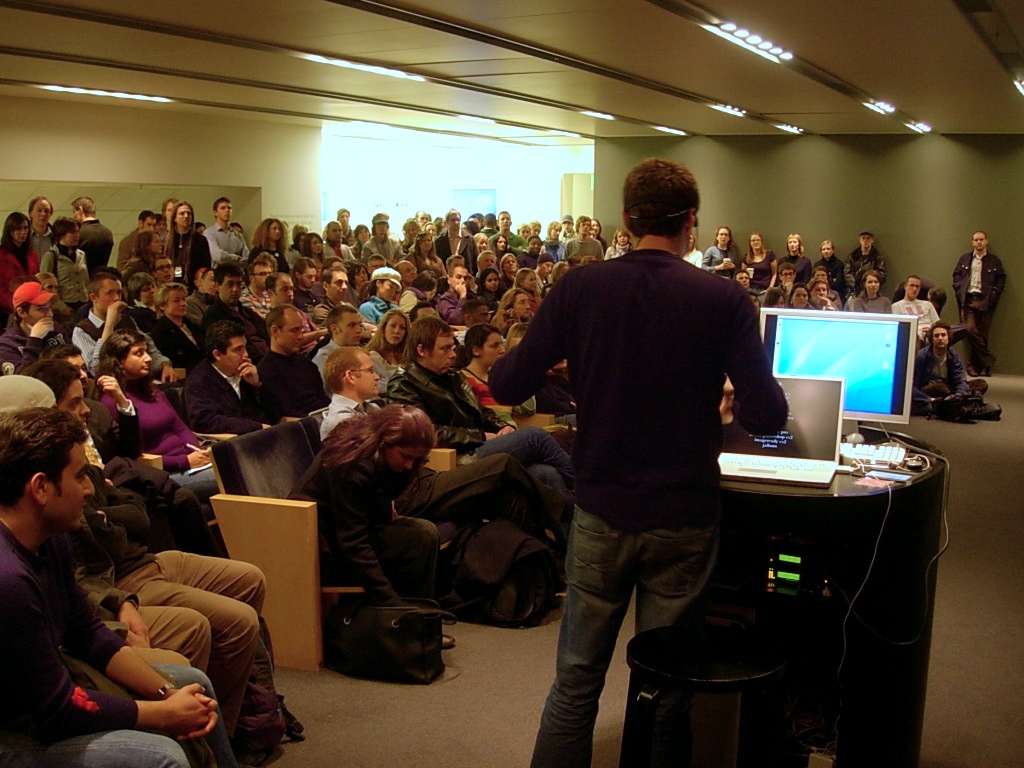
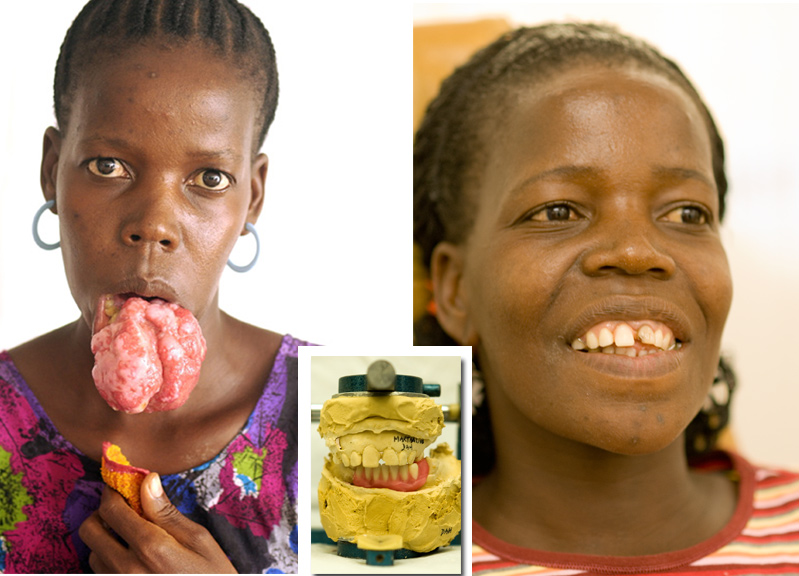 I left the ship early this morning to look up marthaline with a friend. Some of you may remember her story. A monstrous benign tumor grew out of her mouth for years, and she was abandoned by her husband - left to care for three kids. MSF brought her to the ship last year where the offensive mass was removed by Mercy Ship surgeons in a simple hour and a half procedure. We found her on the outskirts of Monrovia. She lives with 12 people in a house about half the size of my last Manhattan apartment. And with her six-year-old son, Newton. Our plan quickly developed, we'd get her a larger room of her own where she can finish going to school. Pay rent for 2 years in advance at a whopping $10 a month so she could learn and not have to worry about the roof over her head. And her son, who for the life of me I couldn't coax a smile out of, should be enrolled as well "No money" Marthaline says. Right. Far too easily, all is arranged. His uniform, books, pencils and year's tuition will set us back about $50. Then in the Land Rover to the dental clinic. The tumor took out almost all of her bottom teeth. The volunteer dentist from America took wax molds and chose 8 false teeth. He asked Marthaline how she liked the spacing, and then made adjustments. She practiced smiling in a mirror. We paid $60 for her new smile. She is truly beautiful now, unrecognizable through the lens. I so clearly remember taking her "before" - but it wasn't the tumor that so disturbed me. It was her eyes. Now, Marthaline's a masterpiece in process, in forward motion. A few small steps closer to wholeness with a little money and a little love. We stood under a palm tree by the ocean and she told me how people treated her. "Not a human being," she said. Her head shook as she remembered almost committing suicide. Today, I'm quite sure she was glad she didn't. - - - - donatemarthaline's full story
 mercy on the move. surgery takes a break in africa, and i fly to europe today for 3 weeks of speaking presentations, location scouting and fundraising for future mercy shows. geneva, lausanne, zurich, prague, berlin, london.
mariama. part 2. human
mercy. 2.10.06  "You left with a pig and brought back a human." "You left with a pig and brought back a human." The man was partly right. They'd brought Mariama back to Guinea. And of course, she was human. But she was never a pig, or a "parasite" as she was often referred to by those in her village. An abused and lonely woman, yes. One not touched in almost 20 years, starved for love and kindness, certainly. But always human. Mariama was despised because of a benign tumor about the size of a grapefruit that grew from her mouth. A familiar sad story in West Africa, a body had gone wrong in a land without access to healthcare. For more than two decades, the mass grew slowly and slightly larger, attracting flies and repelling people. It smelled of rot and infection. She'd cover it whenever she came out of her small mud hut to forage for food. People thought she was cursed and avoided her. You would think maybe she'd find kindness from some of the other women her age. You'd think just once in a while, they'd let her eat with them, cook with them, wash clothes with them. Dance with them. But she wasn't one of them. She would never be. - - - A year ago, a Christian missionary woman who had befriended her brought news of a hospital ship. Jamie heard about the Mercy Ship in Liberia and emailed pictures to us. We said we thought we could operate on Mariama. Thus began the long process to get her here. Papers and visas had to be obtained, but more importantly, both Mariama and her village leaders had to be convinced that the three-day journey to Liberia even made sense. Why should she go anywhere? But Jamie and her husband Cal were patient and persistant. I emailed before and after photos of Beatrice, another woman Mariama's age with a large tumor. I hoped the images might make something tip, and I think they did. Soon, Jamie's husband called from a satellite phone deep in the bush. They were coming. The village leaders had finally given their blessing and even bought Mariama a new outfit. Then a series of firsts for Mariama. Outside the ship, I explained we'd be using cameras to tell her remarkable story. I snapped photos and showed them to her on the digital back. She smiled and laughed, bowing her head shyly at the attention. I'd get to know this gesture well. A mixture of gentle shame and martyrdom. But also one familiar to me from other patients. I knew like so many others, Mariama would leave the ship transformed. Walking up the gangway was easy, but her first flight of stairs down to the hospital turned into a three-hour negotiation. Her first ship, first ocean, first doctors. Florescent lights and narrow corridors. I could only imagine what the ship looked like through her eyes. Yet every step was finally bravely taken, each new fear eventually overcome. Mariama's surgery was relatively simple for Dr. Gary Parker. He'd started removing tumors for free just a year after hers began growing. And this one didn't even make the top 100. Mariama was in the recovery room by lunchtime. A few days later, I saw Mariama off in the early morning. She was glowing, dressed in a beautiful turquoise dress fashion designers would covet. Then after tearful goodbyes, she was gone. Two ship crewmembers went with her and the missionaries to officially "present" her back to her village. Three days later, they did. They told me it couldn't have gone any better. Mariama had changed so much many simply didn't recognize her. She was a celebrity at the border crossings. And back home, mobbed in the market Mariama was generous to all, offering smiles and handshakes. The woman for years rejected, kind to those who had despised her, living a selflessness I hope put them all to shame. And then she danced with the women. An awkward dance practiced only in her mind for 20 years, as they sang, "Mariama's back today. She's well today, today, today." ------------------------------------------------------------------------ THE STORY IN IMAGES 4 minute video. surgery and homecoming all mariama imageswords. part one more patient stories/photos donate tell a friend about mercy. buy mercy
mariama. part 2. human
mercy. 2.10.06  "You left with a pig and brought back a human." "You left with a pig and brought back a human." The man was partly right. They'd brought Mariama back to Guinea. And of course, she was human. But she was never a pig, or a "parasite" as she was often referred to by those in her village. An abused and lonely woman, yes. One not touched in almost 20 years, starved for love and kindness, certainly. But always human. Mariama was despised because of a benign tumor about the size of a grapefruit that grew from her mouth. A familiar sad story in West Africa, a body had gone wrong in a land without access to healthcare. For more than two decades, the mass grew slowly and slightly larger, attracting flies and repelling people. It smelled of rot and infection. She'd cover it whenever she came out of her small mud hut to forage for food. People thought she was cursed and avoided her. You would think maybe she'd find kindness from some of the other women her age. You'd think just once in a while, they'd let her eat with them, cook with them, wash clothes with them. Dance with them. But she wasn't one of them. She would never be. - - - A year ago, a Christian missionary woman who had befriended her brought news of a hospital ship. Jamie heard about the Mercy Ship in Liberia and emailed pictures to us. We said we thought we could operate on Mariama. Thus began the long process to get her here. Papers and visas had to be obtained, but more importantly, both Mariama and her village leaders had to be convinced that the three-day journey to Liberia even made sense. Why should she go anywhere? But Jamie and her husband Cal were patient and persistant. I emailed before and after photos of Beatrice, another woman Mariama's age with a large tumor. I hoped the images might make something tip, and I think they did. Soon, Jamie's husband called from a satellite phone deep in the bush. They were coming. The village leaders had finally given their blessing and even bought Mariama a new outfit. Then a series of firsts for Mariama. Outside the ship, I explained we'd be using cameras to tell her remarkable story. I snapped photos and showed them to her on the digital back. She smiled and laughed, bowing her head shyly at the attention. I'd get to know this gesture well. A mixture of gentle shame and martyrdom. But also one familiar to me from other patients. I knew like so many others, Mariama would leave the ship transformed. Walking up the gangway was easy, but her first flight of stairs down to the hospital turned into a three-hour negotiation. Her first ship, first ocean, first doctors. Florescent lights and narrow corridors. I could only imagine what the ship looked like through her eyes. Yet every step was finally bravely taken, each new fear eventually overcome. Mariama's surgery was relatively simple for Dr. Gary Parker. He'd started removing tumors for free just a year after hers began growing. And this one didn't even make the top 100. Mariama was in the recovery room by lunchtime. A few days later, I saw Mariama off in the early morning. She was glowing, dressed in a beautiful turquoise dress fashion designers would covet. Then after tearful goodbyes, she was gone. Two ship crewmembers went with her and the missionaries to officially "present" her back to her village. Three days later, they did. They told me it couldn't have gone any better. Mariama had changed so much many simply didn't recognize her. She was a celebrity at the border crossings. And back home, mobbed in the market Mariama was generous to all, offering smiles and handshakes. The woman for years rejected, kind to those who had despised her, living a selflessness I hope put them all to shame. And then she danced with the women. An awkward dance practiced only in her mind for 20 years, as they sang, "Mariama's back today. She's well today, today, today." ------------------------------------------------------------------------ THE STORY IN IMAGES 4 minute video. surgery and homecoming all mariama imageswords. part one more patient stories/photos donate tell a friend about mercy. buy mercy
harris goes home. (and throws a party)
 mercy. mercy. 1.28.06 party. Harris threw a party on Wednesday night. It was his first in at least 13 years, and with a little help from an old New-York-City-party-promoter, he killed it. Dinner for 50. Loud music. Two doormen and a crowd outside. The man who lived for more than a decade on the fringe of society, the man once monstrously deformed and rejected was now the instant and unlikely celebrity. It was truly something to see. Harris had come home. And everything was different now. A few hours earlier we stopped for lunch in Buchanan after the long drive from Monrovia. Mercy Ship colleagues Todd and Matt were with me, as was Sam, our Bassa translator. The meal was almost torture for Harris, now only minutes from his home, his father, his neighbors and his canoe. It was the calm before the storm. And looking at Harris across the table, I thought of how in the Bible, a prodigal son came home to a jubilant father who made everyone drop everything and party. He killed the best calf and prepared a feast with dancing and music. As Harris's father is a fisherman, and lives well below the poverty line, I knew this wouldn't be possible for him. "Harris, pick any place in town. We're going to throw a party for you," I said, barely able to contain my excitement at the idea. Harris did a double-take, then knowing me well enough by now to know I was serious, grinned and we high fived. Since the sandwiches we'd ordered hadn't come yet, Harris and I drove off to arrange the evening's festivities at the place he picked, Jah Glory. Outside, I spotted a radio tower and decided we'd crash the United Nations FM station. With Harris in tow. I flashed my press pass at the guards manning the entrance with AK-47's, and we bounded up the steps. I told the station manager Harris's incredible story, and he immediately taped an interview. He had often heard of the man with a tumor by the sea, but had never met him. Harris thrust forward a picture I took of him before surgery, reveling at the man's astonishment. And then it was time for the homecoming. Back to the restaurant to pick up the sandwiches and the others, we headed towards Harris' shack by the sea. Harris grinned and thrust a hand out of the window as we approached. A throng of about a hundred waited. They greeted us with screams. They cried and praised God. Some simply could not believe that here stood the same man they had known. It was chaos. Harris spent about an hour, greeting them, shaking hands, shyly enjoying the attention. He told me he wanted to see his canoe, and a shout went up from the crowd. The fisherman was back to fish. We walked the same path to the beach that we had a month earlier, this time trailed by a throng, dancing and shouting. It was just over a month ago that our worlds collided. After an eavesdropped conversation led me to find Harris by the ocean. A month since the 34-year-old man with a seven-pound tumor in his mouth walked with me up the gangway of a hospital ship towards new life. It was a magical time for both of us. * * * His last days on board the ship were anything but dull. After a dramatic seven-hour surgery, his tumor was thrown with medical waste into the ship's incinerator. And then I watched as Harris began a painful recovery process. Unlike so many others, who tread tentatively with baby steps, Harris leapt foward towards health with a strong will and forced grins. Food by tube and then to soft diet. Ensure. A blue handheld mirror, the now constant prop, replaced the dirty brown towel that used to catch the steady drain of pus from his mouth. He was learning to put his lips back together. Learning to speak again. And most importantly, learning to laugh. He was full of zest now, full of fire and always getting in trouble. Urinating into the sea off the back of our 522-foot floating hospital when he thought nobody was watching. Sneaking a cigarette in the bathroom of the ward. Playing practical jokes on patients in nearby beds. But the jester was also a gentleman. I'd catch him cradling a baby in his arms, softly encouraging a patient who'd just had surgery. And finally, it was time to go home. He'll need to wait two months before his second surgery, a bone graft slated for April 2. Anxious at first, he was bursting at the seams the morning we left. If anyone deserved a good party, it was Harris. * * * We joined the party at Jah Glory around 8:30 p.m - fashionably late. Two policemen worked the door, and I pushed us through a large crowd to reach the door. People from the town's other radio station were there to interview Harris. He had changed into the black Banana Republic mercy shirt I'd given him on the ship, and was moving easily between the room where they would eat and the door. I got the guys from the radio station past the doormen, and because Harris was so busy, spoke to them first. I talked into an old tape recorder about Harris, about his courage and remarkable faith in a God he truly trusted to deliver him one day. Harris took over a few minutes later and told them himself. While he was occupied, I spoke about his surgery to a table of about twenty I was later told were ex-combatants. So interesting to me that Harris had invited some of the people that had treated him cruelly for a decade. I explained that Harris's tumor hadn't grown as a result of a curse. I told them the extra skin on his face would shrink over the next few months as his face remembered its pre-tumor shape. I explained about the bone graft he would have on April 2. It was after midnight when Todd, Matt, Sam and I left for a tent at the nearby UN army compound, and the party showed no sign of slowing. It cost me $180. White rice and cassava and fish for about 50 at $1 a head. The rest in drinks. And $5 each for our bouncers, the Liberian National police. It was the best money I've spent in years.
epilogue:The next morning, word had spread of Harris's healing throughout Buchanan. When we arrived at his shack, a crowd of sick waited for us outside. Some had clubbed feet and were lame, some had goiters. Some came in wheelchairs. Simeon showed me a swollen pouch of flesh in his side where he thinks the bullet that shot him still is. Little Nyanyan had a huge swollen head - water had leaked into her brain. I examined a boy with epilepsy, and another that shakes violently in the night. A little baby with a neck that wouldn't move and eyes rolled back in her head. I donned rubber gloves from the first aid kid to avoid infection from open wounds, took pictures of all of them and contact information, referring many who were not candidates for surgery to Monrovia clinics and doctors. Perhaps it was the desperation of the situation, seeing so many with conditions we couldn't operate on, so many we couldn't fix, that prompted us to pray. After the mini-screening was over, we invited them one by one to enter Harris's dingy, broken room and sit with us. The four of us huddled around in wooden and straw chairs, and spent the next few hours with them. We prayed to the same God Harris had for years. A God we believe has the power to save. A God we believe is in the business of finding the lost sheep. Towards the end of our time with them, Phillip walked into the room. Phillip had a large tumor on his face that had been growing for 9 years. It took me only a second to know we'd bring him back with us to the ship. He had surgery 24 hours later. ---------------------------------------------------- THE STORY IN IMAGES 3 minute video of homecoming homecoming. images.more words. harris parts one & two phillipmore patient stories/photosdonatefeedbacktell a friend
 meet mariama. meet mariama.january 17, 2006. 12:25 p.m. "Scott Harrison, please dial 151. Scott Harrison, please dial 151." I was eating lunch when the call came over the ship's overhead paging system. I ran to a phone and dialed the extension, which connects us to calls from the outside. It was Jamie and Cheryl. They had just crossed the border and entered Liberia. Mariama was with them. I ran down the gangway and let the ship's security guards know to expect a woman in four hours or so with a large tumor. I asked them to page me when she arrived. Today would be a great day. I first heard about Mariama in November. I was forwarded an email with her pictures - images of a woman with a huge tumor growing out of her mouth. I knew she lived in a remote part of Guinea - a three days journey from our ship's berth in Monrovia, Liberia. Jamie and Cheryl were two Christian missionaries who had found her and knew her condition might be treatable on our hospital ship. Mariama's tumor had grown for 20 years, but she had never left her village before. I initially offered to drive into Guinea to pick her up, but the missionaries said they'd try to convince her to travel with them to the ship. Mariama had no papers, so that would take some time to arrange. We told them to come whenever they could. Over the past few months, I spoke off and on to Jamie, who would call to give updates from a satellite phone deep in the Guinean bush. They said it was difficult to convince Mariama to come. Her brother was against it. Her village was against it. Hoping it would help, I sent before and after surgery pictures of Beatrice, a patient from whose mouth we had removed a 8 pound tumor. The pictures eventually made the difference. A few weeks, ago, Cheryl called and said they were coming. Mariama had agreed to make the journey. The leaders of her village had finally agreed to let her go, and finally given their blessing. And today they would arrive. 5:45 p.m."She's here!" A ship security guard gave me the news by reception, and I bounded down the gangway and greeted the threesome. Todd, a friend and cameraman, joined me and explained to Mariama through Jamie that we'd like to film and photograph her, to tell her story. Mariama speaks Fula, and not English. She was shy and hesistant, but agreed and as I photographed her; laughing as I showed her the images on my digital camera back. Enter Sonja Frischknecht, who heads up Healthcare Services. Sonja is kind and always smiling, as we walked up the gangway together and entered the ship. Everything was fine well past reception and down the first corridor until we reached a staircase leading down to the ship's ward. Mariama had never seen stairs before. And she wouldn't budge. The missionaries spoke to her in Fula, and told us she was worried she'd never come back up. And that we would operate immediately. She kept peering over the edge, terror in her eyes. I ran down to the ward to enlist Harris's help. Even though he didn't speak her language, I thought maybe he could convince her to come. Harris eagerly bounced up the stairs with me, armed with his before photo and did his best. "Smile, Harris. Just smile!" I said as we crowded the stairwell. We tried everything. "Harris! Go down and come back up! Then she'll know it's okay." Harris complied, disappearing and then reappearing. But Mariama still wouldn't budge. Harris extended a hand. I offered to take pictures of what's "downstairs." Nothing worked. Ship staff and visitors bustled by the busy staircase as we negotiated. People greeted Mariama with smiles and handshakes. Mariama was terribly frightened. And who could blame her. She was at one time reportedly told by her villagers, adament against her leaving, that the white people would eat her. And he we were, gathered in a crowd, speaking in strange tongues, trying to coax her down a narrow staircase with florescent lighting. We decide to go back outside and slow things down. 6:55 p.m.I'm back on the ward, asking patients, translators, nurses: "Anyone speak Fula?" Nobody did, but Harris grabbed me. "Scott, go to Waterside and find some Fula people. Bring them back to her." Now Waterside is among the more dangerous areas of Monrovia, and not a place to travel after dark. I laughed at Harris. And then, from across the ward, Alphonso waved me over. Alphonso is Beatrice's son. I haven't seen him for six months, since Beatrice's surgery. And guess who was still in the Operating Room at seven p.m. Beatrice. She'd come back this morning for reconstructive surgery. Alphonso said he knew some Fula people that lived next to him. They were originally from Guinea, and spoke Mariama's language. 7:40 p.m.I grabbed Todd and we jumped in a Land Rover for Clara Town. We found the Fula couple we were looking for next to Beatrice's house, and I explained our situation. Mohammed and his wife agreed to come with us and said they would talk to Mariama. They had witnessed first hand their neighbor's transformation after surgery, and could vouch for our intentions and results. After first visiting their amputee friend who had reinjured his bad leg, and promising to send back ibuprofen for the pain, we headed back to the ship. 8:20 p.m.Dockside again under the post-operative care tent. Mohammed and his wife spoke to Mariama in words we were unsure of. But their tone was stern. Something along the lines of, "You've traveled three days to get an free operation. You're crazy if you don't get back on the ship." Jamie told us a few minutes later, "They gave her a guilt trip." 8:45 p.m.Mariama walked up the gangway again, and down the corridor to the ward. To the staircase. And this time she descended. She entered the ship's ward, a ward bustling with patients and visitors, and settled in the Intensive Care room, where she will enjoy some privacy tonight, some time to adjust. Jamie will sleep in the bed next to her. 9:05 p.m.Harris stood in the ICU doorway as I held Mariama's and said go odnight reassuringly. And then Mariama spoke to me through Jamie. She said that where she came from, people were afraid of her, they were afraid to touch her, afraid to look at her. She said this place was different. Yes, this place is different.
see a 10 minute video of mariama entering the shipsee photosdonatemore patient stories
greenville
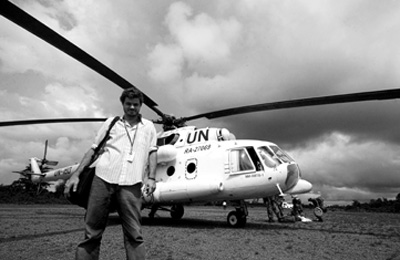 chopper trip with ethiopian troops to greenville, liberia. 80 minutes in the air, 14 hours by road. All the pictures HERE
Harris. Part 2.
 becoming harris. becoming harris."It's too... it's too heavy. It hurts. I want them to take it out. All in the ear, all in the mouth, you see... all the teeth that were here, all moved." "I am feeling it. It's really hurting. I can feel the joint of the bone. I'm tired with it now." it weighed six pounds, four ounces. the weight of a newborn. the weight of a laptop. a 3 liter bottle of coke. two leatherbound volumes of complete Shakespeare. the tumor is out of Harris's face. For more than a decade, there seemed no hope for Harris. A monstrous benign tumor filled his mouth, and was slowly suffocating him. And he couldn't have suffered in a worse place. Harri s's home, Liberia, is perhaps the world's poorest country. It is a land ruined by civil war with no public electricity, running water, sewage or mail. It's a land where maxillo-facial surgery is but a dream. But somewhere and somehow, perhaps one evening, gliding in his canoe on a dark ocean, Harris found and clung to hope. And he waited for more than 10 years, living in a crude shack by the sea, struggling to survive, fishing to find his next meal. Harris had an encounter with God, and began to pray earnestly and often for a miracle. He said he realized God had many children, and was very busy tending to them all. But he knew he would be delivered one day. Yesterday, more than 13 years since his tumor began growing, I saw what that miracle looked like in an operating room. A messy and bloody miracle on a ship in West Africa. A miracle that involved two volunteer surgeons and three anesthetists working for four hours to remove the tumor that had wrecked Harris's face. And then worked for another three to put him back together again. But just finding Harris was a miracle in itself. It was around midday in Buchanan, more than four hours from the ship, when I stopped in a rice store with Todd, a cameraman and friend. We were about to start the last leg of a long journey into the bush to take a patient called Joseph home. As we bought rice for his family and village, I noticed a man in the store make a gesture to his face that seemed familiar. As if to describe a tumor. I felt strangely compelled to break into the conversation and interrupt. The man told me about Harris. Less than an hour later, we found Harris by the ocean, walking towards us on the road. We jumped out of the Land Rover and told him that we lived on a ship that specialized in the removal of tumors. We said we would come for him in the morning. Harris tells me he was skeptical. He had been lied to many times in the past. People had taken his picture, always taken his picture. Run it in the paper. People had made empty promises to help him yet none had returned to help. The next morning Harris came with us to the Mercy Ship in Monrovia. His father accompanied us on a long, joyful ride over awful roads towards new life. It took Harris two weeks to get strong enough for surgery - two weeks of blood transfusions and iron supplements and solid meals. He spent Christmas with us and I watched him shyly tear through gift-wrapping to get to a radio, pocketknife and model car. And a Santa hat. My DV camera was an ever-present part of our relationship. I think Todd and I shot six or seven hours of footage before even realizing what we were documenting. Instinctively capturing his journey. Documenting this extraordinary life. I've gotten to know Harris pretty well over the past two weeks. He is the constant jester, his eyes mischievously dancing and scheming his next prank. The pus that dripped from his tumor and accompanying towel became almost invisible to me, and I grew to understand his muffled speech. I learned much about what his life was like living with a tumor. About war, rebel soldiers, and plenty about fishing. Storms and sharks and navigation by mountains and stars. And of his conversations with God, of a deep faith that moved things. I have never met anyone like him. What he has suffered is unthinkable to me. Bouts of bleeding that caused him to lose up to a liter of blood at a time. Headaches that lasted for weeks. An constant oppressive weight that pulled his head down sideways. Yet he fought. He hoped. He remained faithful to his belief in an unseen God. And there is more fight ahead. His miracle is messy and involves a journey of recovery. The tumor badly stretched the skin on the left side of his face and absorbed three quarters of his teeth. The skin could not all be trimmed, because it will remember its old face and slowly begin to shrink. Harris will spend two months with us in recovery before his next surgery, where Dr. Gary Parker will take a piece of bone from hip and rib and attach the bits to the titanium plate that is now his lower jaw. He must learn how to speak again and to eat. He's out of the gate fast. Last night we marveled as, through the morphine, he held a mirror in his left hand, and felt the contour of his chin and cheek with his right. He smiled and nodded. Harris asked if we could save his tumor for him. "I want to punch it. I want to punch it like this," he demonstrated, violently smacking the air with his fist. We did the next best thi ng for him. When it had been removed from his face last night, placed in a plastic bag for medical waste and then a brown paper one, we followed it to the incinerator... I rolled camera as Todd pretended to punch the bag with his fist. "This is for you Harris. This is for you," he shouted over the din of the incinerator before tossing the bag into the flames. * * * An hour ago on the ward, I wat ched through tears as Harris and his father were reunited after two weeks. Harris grinned when he saw his father, a smile previously made impossible by the tumor, and one I'll look forward to getting used to. His father knelt beside his bed with tears in his eyes and looked up at the ceiling. "I am looking for God. I am looking for God," he said. -------------------------------------------------------------------- THE STORY IN IMAGES video clips. surgery & recoveryharris. images.more words. harris part onemore patient stories/photos donate
mercy christmas. meet harris.
 Let me tell you a Christmas story. A man sits alone on a long wooden canoe, staring out into the ocean. He is about to begin his daily fishing trip, which will begin in the late afternoon and end at dawn the next morning. He waits for his father to arrive, and like most days, the two of them will spend the next 16 hours together in silence, fishing a dark sea. On a good evening, they will catch five or six fish they might sell for about $1 each - if it is a bad one they will return with nothing. The man has terrible posture. He's weighed down by a huge tumor on the side of his face. It's just smaller than a basketball, and has been growing for 13 of his 34 years. A pink and red mass, it spills out of his mouth. A dirty brown towel is draped around his neck. It is a part of him, constantly in motion, constantly catching the murky pus that drips from his face. When the man speaks, it is in deeply muffled English or Bassa, the native dialect for his region of Eastern Liberia. It is only a few days before Christmas - a holiday that has brought him little joy for more than a decade. It was more than 13 years ago that this benign growth started with a toothache. It grew slowly over the years into a ten-pound monster and forced him into isolation. He is an elephant man, shocking to behold as he slinks from his canoe to his home - a crude structure made of twisted scrap metal a few hundred yards from the shore. The man's name is Harris. And a ship is about to change his life. * * * Tuesday, I left the Mercy Ship in Monrovia, Liberia with Todd, a friend and cameraman. We were off to reunite a patient and friend named Joseph Jones with his village deep in the jungle. The journey would take about six hours, and after his life-changing surgery (see story), we were anxious to see the celebration firsthand. About four hours into the journey, in a sleepy town by the sea called Buchanan, we stopped in a small market to buy two bags of rice for Joseph's family. And then this thing happened. As I was waiting to pay, I looked to my right and saw a man making a familiar gesture. He moved his hand to and from the right side of his face, describing something. The man spoke quickly and shook his head. I couldn't understand what he was saying, yet I felt compelled to walk over and ask him what he was doing. It turned out he was talking about a man with a large tumor. He was talking about Harris. Of all the rice stores in all the towns in all the world... A boy in the store no older than six said he knew where I could find the man, and off we went. Harris wasn't at home. Or at his father's home. But as I drove towards the ocean, there he was, walking towards me. I had a magical Christmas story to tell him. Grabbing his hand, I told him that I lived on a giant hospital ship in Monrovia. A place where surgeons from the west performed thousands of free surgeries. I told him that we specialized in the removal of large benign tumors, tumors even larger than his. And I thought we could help him. Would he come with me in the morning? He had been waiting 13 years for this moment. He had been praying for 13 years. His father stood next to him, incredulous. Of course he would come. At what time?? We agreed on 9 and Harris threw his hands over his head. His lips tried to form a beautiful smile and he waved as we walked away. It was exactly what hope looked like and it made me cry. * * * The reunion later that evening in Joseph's village was glorious. Our friend was literally ambushed - attacked by jubilant family and villagers, not expecting his return. They knew Joseph as a man with deformity for more than 20 years and embraced him, incredulous and joyful. It was a six-hour celebration with singing, shouting, dancing and palm wine. I accepted a rooster, plantains and two eggs from villagers on behalf of the ship. The people of Korkordavidtown made speeches and thanked God for answering their prayers. Todd and I spent the evening in Joseph's hut with a crowing rooster and friendly spiders, and left before the break of dawn. We reached Harris in good spirits, and he took us to his canoe - to meet his brother by the sea. We promised to carry him safely to the ship, and moments later, we were all packed in a Land Rover hurtling towards Monrovia. Todd and I got to know Harris during the long drive back to the ship. Michael Jackson and Stevie Wonder blasted on the Ipod and I almost drove the Rover into a ditch when I heard Harris chime in on "I Just Called to Say I Love You." He made fun of my driving as we bounced noisily over potholes and lamented the state of Liberian roads. I asked what he hoped for, if we were able to operate. He said he would be filled with joy. He would be a new person. He would be free. I also asked Harris what he wanted for Christmas and he said he had no expectations. People had never given him gifts. I pressed him and he told me he hoped for a meal. Or maybe small money to buy food supplies at the store. Chief Medical Officer Dr. Gary Parker examined Harris on the ship late yesterday afternoon, and admitted him immediately to the ship's ward. He will spend Christmas with us and enjoy three meals and troupes of carolers. His surgery is scheduled for January 5th, a surgery Dr. Parker thinks will take about four hours. He has been given several blood tranfusions after his hemoglobin count was found to be 4 - a quarter that of a healthy person's. And he told Dr. Parker of recent bouts of bleeding that caused him to lose up to a liter of blood. Dr. Parker thinks Harris had only a month or two to live without surgical intervention. * * * I was interrupted writing this letter by a nurse who brought Harris by my photo office, just down a long corridor from the ward. I showed him pictures of people we'd helped on the ship - people with tumors like his. He stared wide-eyed at my Powerbook screen. Alfred. Beatrice. Patrick. Deborah. Hawa. Friday. Marthaline. Harris. I think I know how his story ends. ---------------------------------------------------------------------------- click here for video of joseph's homecomingclick here for video of harrisphotos of harrismore patient storiesdonate
meet joseph jones.

mercy.
12.1.05. from liberia, west africa.
Joseph Jones is 32 years old. His has not been an easy life.
When he was a small boy, a benign tumor began growing on his neck. Over the years, a small lump grew into an oscar-worthy special effect, and played lead villain for the better part of his Joseph's life. When he turned 20 near the start of Liberia's civil war, it took a temporary back seat as rebel soldiers stormed into his sleepy village killing his parents and friends. Joseph narrowly escaped into the dense rainforest where he waited out the attack. Returning home to the stench of death and tragedy, he wept freely. For many reasons.
When Joseph speaks, he begins with a shudder as his facial muscles tense, his eyes squint and his lips tremble. After a moment, sound emerges - halted and pushed.
I first spoke to him outside the ship's gangway a few weeks ago. We sat on a wooden bench together and talked, only 2 years separating us in age, only a few inches in height. Yet I was born in one of the world's richest nations, he in a war-torn country with no electricity or running water - where one doctor serves 50,000 people. Our worlds met as the vast ocean between New York and Liberia delivered a fully-equipped hospital ship and western surgeons to his country's port.
It's often hard for me to explain to friends and family back in Manhattan just how poor Liberians are. About six hours from the broken-down capital, Monrovia, Joseph lives in a village called Korkordavidtown. He sells palm oil for a living. This consists of about seven days work collecting the palm, then two or three days work turning it into oil. After ten days, he can produce about five gallons of oil. This he sells for $4. So Joseph makes about 40 cents a day, or $144 a year. He uses the money to buy soap, clothes and food.
Joseph said his tumor made people afraid of him. Or, if they weren't afraid, they just laughed at him. He knew for years the only place he could get help was a hospital, but even his wildest dreams didn't allow money for an operation. So Joseph prayed. For about 20 years.
Now I'm a New Yorker, and about as cynical as they come. More cynical, actually. The conversation went like this.
"Cmon Joseph. What do you mean you prayed?? How did you pray??? What did you pray???"
"I prayed that God would bring the hospital to me. Every night."
Right.
And he told everyone in his village that it would happen. He told them he was certain one day, he would somehow reach a hospital and have the work done. So last year, when Joseph heard on the radio that a hospital ship was coming for the first time to Liberia full of surgeons who gave free operations, he wasn't surprised. Nor was he surprised that the ship specialized in the removal of benign tumors.
Right.
I can only marvel at that kind of faith. At that kind of endurance. It seems far removed from the reality I have allowed myself. Could I suffer for even 5 years with an enormous tumor? Absorb scorn and hatred for something that wasn't my fault? Would I pray for deliverance to an unseen God for 20 years? And continue to believe?
Each miracle I see here brings me a little closer.
Volunteering with Mercy Ships for 13 months now, I've taken over 60,000 photographs. I've seen thousands of people with unthinkable defomities, desperate to see our doctors, clinging to a small hope for salvation. I know what poverty really looks like. I also know what can be done about it. I've photographed more than 20 operations on the ship, and seen the lives of the poor transformed through the sacrifices of real life Good Samaritans and through the funding that allows their work.
But more importantly, as I photograph almost every patient we treat, I've had the honor of learning from these truly remarkable people. Joseph just added his name to a lengthening list of heroes that clung to hope and faith, refusing to give up the fight for life and survival. I have so much to learn from them.
Joseph went home on Wednesday. The 550 gram tumor joined the ship's medical waste, and he seemed at ease. We were able to help him with a little money for a dowry so he could marry his fiancee. And although the operation didn't fix his broken speech, he struggled and grinned as he planned what he'd say to all those who had doubted him.
"I will be feeling happy. I will tell them all God has answered my prayer."
see joseph's photos
email me here
more patient stories/photos

mercy. liberia. november.
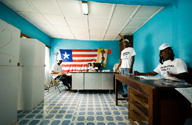 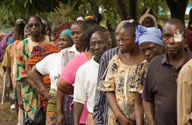 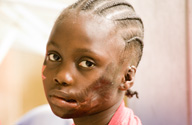 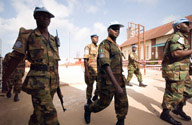 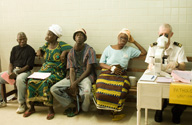 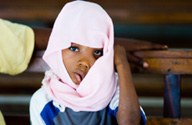
mercy.
November 13, 2005
The past two weeks in Liberia have passed like months. I've photographed the nation's first elections after more than 14 years of brutal civil war, escaped a riot as angry protesters met UN peacekeepers and tear gas, and of course, did what I came back to Africa to do - documented hundreds of patients scheduled for free surgery onboard our hospital ship.
Liberia treads gingerly towards a future of peace and promise. The pot-holed streets of Monrovia host voters who speak about hope yet seem doubtful. The Ak-47's on the more than 15,000 United Nations troops swing at attention as tanks roll visibly and loudly down Broad Street. Sirens wail and armored convoys are a dime a dozen. And, as I'm writing this, it seems Liberians have elected Africa's first woman president. Ever.
A week ago it looked like a soccer player would be the country's first president after the long war, yet today with 97 percent of precincts reporting, a woman, Harvard grad World Bank ex Ellen Johnson-Sirleaf has an insurmountable 18 point lead. But African politics are never simple. George Weah has cried foul and his supporters have taken to the streets in protest. No Weah, No Peace! they chant, hurling rocks. It's doubtful anyone will listen. I observed the elections firsthand, traveling to ten Monrovia polling stations, and was impressed at the meticulous order and fairness of the process.
But days before hundreds of thousands of voters stood in line at the polls, a different line formed outside a Monrovia hospital to meet our Mercy Ship surgeons. A line formed of the sick and desperate - those to whom politics took a back burner. Some fought just to stay alive in a country with almost no access to healthcare, where one doctor serves 50,000. They waited in early morning heat as I sprung out of bed at 4:26 and drove to the hospital to begin screening day.
My job again was to photograph the patients we book for surgery. Between white sheets haphazardly strung on rope, my little portrait station was the second to last stop, and a feel good gig. Unlike many of the earlier stations, where doctors have to gently turn away those whose are inoperable or untreatable, if they reach me they've passed the emotional gauntlet of more than 10 doctors, nurses and surgeons, and are cleared for surgery. They've passed the test of needles, tongue depressors and blood pressure cuffs.
They come to me with hope. Hope that their benign tumor might now not suffocate or starve them to death. That years of scorn and dirty looks thrown their way as a result of their cleft lip might vanish in an hour-long operation. That their sight might be restored again after a surgeon sucks cataracts out with machines in a 20-minute operation.
---
Back in NY, as I finished hanging the mercy exhibition at the Metropolitan Pavilion Gallery in Chelsea, I realized I didn't have enough moving images. The stills and storyboards didn't seem to do justice to the people I'd come face to face with. I knew our patients in motion. As living breathing humans - heroes who had suffered much and survived. Heroes snorting food through noses to stay alive as tumors blocked their mouths. Heroes who had never lost grip of hope, praying with unwavering faith for salvation.
Warhol made an eight-hour silent film in the 60's, where he showed only a man sleeping. It was interesting and disturbing. With that in mind, after photographing the patients, I decided to ask some of them to tell their stories on camera without using words. I asked them to simply look into the camera and left the station, hoping to capture on video what it was really like to be them. To live inside their skin. Back in my office later, I wept, watching the footage.
There was something so singular and direct about the message. For me, I'd recently been overwhelmed with the sheer numbers and hopelessness surrounding me - an even poorer mass of humanity seemed to inhabit Monrovia. So many poor, so many sick with no access to healthcare. By mid-afternoon at screening, I had wondered what was wrong with me. I wasn't struggling to fight back tears this time around. Was this what happened to humanitarian workers? Was I becoming numb? Lost in the numbers? Was it time to throw my hands up in the air and go home?
Yet watching the footage, the message hit me. Without words, the individuals seemed to scream out, "I am a child of God - do something." It was an appeal, and it made me squirm.
It's easy to shut down when viewing a graphic photo. Some of the images I capture seem so disconnected from reality. But watching the deformed lick their lips in close-up, watching eyes dart back and forth as if looking to escape from tormentors, I connected again.
And this time, it was on a spiritual level.
As many of you know, Mercy Ships is a faith-based organization. The surgeries done onboard the ship are modern-day answers to miraculous events in Bible times. The lame walk through orthopedic operations, the blind see when cataracts are removed, the mute speak when tumors meet scalpels and cleft lips are closed.
Back home, it's so easy to discredit Christianity and the Bible because of so many who simply don't walk the talk and have swapped love for judgement - but here, seeing the teachings of Christ and altruistic love in action... it makes so much sense to me.
To me, Jesus was all about the one. And He was all about extremes. Whether it was a lost sheep or hooker, he desperately sought out the marginalized and insisted on making them whole. He went after drunks and corrupt taxmen and delighted in transforming their lives. And the work was important. Neighbors were roused and a party thrown when a mangy sheep was found. A feast and fine clothes appeared for a prodigal son who limped home after years of debauchery.
---
Towards the end of screening day, I met Hawa.
She was a beautiful seven-year-old girl from Sierra Leone, and was being choked to death by a fast-growing benign tumor. Five people came over to my photo station wide-eyed, asking whether I'd seen her before I finally went in search of her. I found her by the pathology station waiting for the moment of truth. Was the tumor benign? Could we operate?
The answer was yes, and I photographed her an hour later.
Only a few weeks into a long outreach where we'll do thousands of procedures, Hawa is a beautiful reminder for me of God's love for "the one." Her sad story is not so different than many, and a loving father carried her two days and across a border for a last hope at her life.
Photographing her surgery, and getting to know her on the ship's ward has been a real reminder of why I came back to the ship, back to Africa. And I really do love the crazy idea, that if all 350 of us crew jumped on planes just to save little Hawa from her suffering and certain premature death, it would be worth it. Somehow that would be ok.
It doesn't work for me on a practical level, in a world where millions are vaccinated for pennies, but I catch a glimpse of the Creator's heart and love for a little girl every time I see her smile.
-----------------------------------------
To view a small sample of the video footage I shot at patient screening, please click here.
To meet Hawa, click here.
If you'd like to help financially support the work of mercy ships, drop me a line: scott@onamercyship.com or go here
August 29 - September 8th. New York City Art Exhibition and Fundraiser. See www.mercynewyork.com for more information. "Mercy" will be a mixed media show of more than 80 pieces in 8000 square feet. 
dry.
notes from west africa - may 31.2005
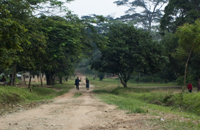
Yamah gave birth at the wrong time. The place wasn't ideal either, a West African nation tangled in a brutal civil war, but the timing, late 1994, was just plain awful. Just after Yamah went into labor, rebels stormed into the village of Gbarnga, Liberia, sending the town's inhabitants scurrying to safety in the bush. Among them were the midwives, and Yamah spent four days in intense pain searching for someone to help deliver her baby. Finally, old lady Kpeh was located, and a delivery that began at six a.m. finished twelve hours later.
She gave birth to a stillborn child and Yamah began leaking urine through her birth canal. She developed a condition called vesicovaginal fistula or "VVF" as it's known among doctors. During delivery, the extended pressure of the baby's head against her pelvis left a hole in the tissue between the bladder and the birth canal.
Although unheard of in developed nations for almost a century (the last fistula hospital in the US closed near the end of the 19th century), because of where she was born, Yamah is not alone with this condition. The United Nations estimates two million women in Africa and Asia suffer from this condition, many of them constantly leaking feces as well.
So Yamah did what most would do. She sought a doctor. During war this wasn't easy, and she was told simply by the ones she found that her problem was "too heavy." It's hard to imagine, but because of her incontinence, Yamah smelled of urine. All the time. She would avoid people, staying mainly inside her house, but when she did come in contact with them, she said they would give her dirty looks and "talk bad about her."
In 1998, during a lull in the war, she met Sam. Sam had returned to Liberia from Guinea where he had fled to escape the fighting, and sought treatment for his leprosy at the Ganta Rehab Center. He came with a badly ulcerated leg that was later to be amputated and replaced with a crutch. Although cured now, Sam has dark, sorrowful eyes and bears the scars of leprosy in his face.
He tells me he met Yamah when she ventured out to buy something.
"I asked her to be my friend," Sam says. "She told me her problem. I said okay, we will see about it."
The next few years were difficult but Sam says he stayed with her. "I used to sometimes comfort her that God one day might make her better. I made up my mind for she and myself to be together."
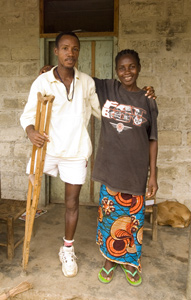
A fine pair of misfits they were, Sam, hobbling along on one leg, making and selling straw baskets for about $8 each, saving money. Yamah, hiding in the house, unable to shake a constant stench of urine.
Hope came in the form of a visiting surgeon at local hospital, a sleepy facility founded by an American missionary in the 1920's. It is one of only three places in the country where it is possible to have a fistula surgery - when a qualified surgeon is present. But most women can only dream of obtaining the $150 it costs for the procedure.
Luckily for Yamah, Sam the leper had somehow saved enough money for the operation. She was admitted to hospital in November of 2000 and scheduled for surgery. Six years after she began leaking.
The operation is a tricky one, and requires great skill on the part of the surgeon. Many patients are determined unfixable after an initial examination yet fortunately, this wasn't the case for Yamah. Her operation seemed a success at its completion, Sam tells me, until a nurse, while removing the catheter, just "pull it."
It's gruesome to hear him describe it, "The blood started coming," he says. Hope yanked away and replaced with fear, more urine, and this time intense pain.
As the surgeon was leaving the next day to accept a scholarship in the United States, Sam and Yamah were told sorry, nothing can be done.
Another three years of suffering passed before Sam heard on the radio that a ship was coming to Liberia that provided free surgery - fistula fixes among the procedures performed.
At the screening date in early March, Mercy Ships doctors examined Yamah, and Sam says he just sat outside praying. "This is the last chance," he says he thought. "If people come from another country and they fail, how are we gonna manage now." Sam says while waiting, he saw another woman with a VVF rejected for surgery, her tear deemed irreparable. "I said, oh... what if this happen to my wife too."
Yamah was examined by Scottish surgeon Dr. Fiona Burslem and scheduled for surgery. Although it is uncommon that surgeons will attempt to "fix" other surgeons failed operations, Dr. Burslem thought she could repair Yamah. She scheduled her for surgery on March 30.
Sam says they left early and traveled across the country to Monrovia, where the ship is docked. They arrived on March 28.
"I was so excited, I met security. They said not to enter yet. I started appealing. Economic reasons first. I said please find somebody to talk to. I saw Betty (a nurse on the ship). When she came, I explain I want to be on time. She went and checked, she found an empty bed."
Yamah said when she saw the ship, she felt peace. It was her first time to Monrovia, her first time seeing a ship. "I was not scared," she said. "I knew my problem would be solved. I was praying, every morning, every evening."
Late in the afternoon of March 30th, after the surgical procedure, Yamah woke up in the ship's hospital ward, dry for the first time in 11 years.
* * *
Yamah has a lovely smile and shy, girlish giggle that now seem ever present. She thinks she's about 30 years old now, but looks younger. We talked as she scrubbed clothes on the doorstep of the small stone house where she lives with Sam on the fringe of the Rehab leprosy compound. Chickens and small dogs sometimes interrupted and were chased away by a brandished broomstick.
She has been transformed. She has made new friends, she can go out among people without fearing their looks of scorn and disgust. She can go to church without spoiling her clothes.
"My heart is all right. I feel free," she says simply.
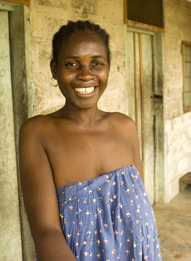 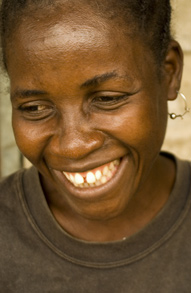
----------------------------------------------
GET THE PDF OF THIS STORY HERE.
To watch a five minute video of Mercy Ships's work and learn more about VVF surgery, please visit http://www.onamercyship.com/video.html
If you're interested in sponsoring a surgery or supporting the work of mercy ships, write me here: scott@onamercyship.com
please visit www.onamercyship.com
for more images and words, including the latest pics from five days in the leper colony here.
|





























